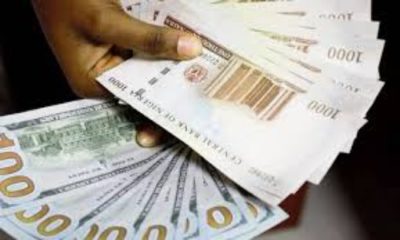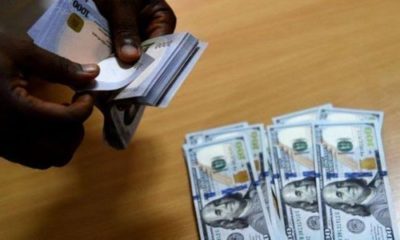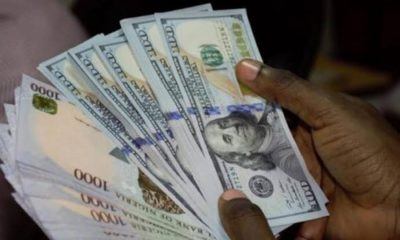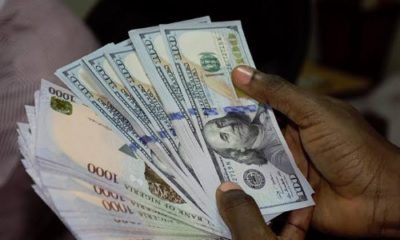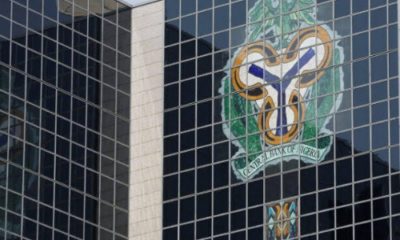Finance
Emefiele and the economics of the Naira free fall

By Udo NTUDO
LAGOS-EVER since the naira entered into a tail-spin, performing woefully against other currencies, there has been an outpouring of concern by disillusioned citizens. Perhaps because of the high prevalence of poison in contemporary politics in the country, all manner of suggestions have been made.
One of such suggestions that have not only heightened exasperation among the informed but also exposed the degree of ignorance of their proponents is the tendency to blame the Governor of the Central Bank of Nigeria (CBN), Mr Godwin Emefiele for the fate of the naira. This argument is not only hare-brained but reflective of the tear-jerking ignorance that inspires its protagonists.
For starters, elementary economics tells us that the value of any currency is determined by a predictable composite, one of the most critical of which is the aggregate contribution of economic production to the gross domestic product of the economy. For a mono-product economy like Nigeria’s, which depends almost solely on oil, this scenario, in itself, is well-defined for economic disaster which is exactly what is playing out.
Rather than waste energy in dramatizing ignorance of basic economic principles, protagonists of trending politics, that is dripping with poison and vendetta, should concern themselves with questions like, why has it remained convenient for the FG to continue to grant import waivers for items as basic and ridiculous as tooth picks and bottled water among others that profile the vanity of a lazy middle class? Rather than review the quantum of rudderless economic policies, which precipitated the exodus of manufacturing companies from Nigeria to neighbouring countries, the apostles of the trending politics of poison and vendetta seem determined to tackle the same person who has been battling to manage the consequences of the riotous politicking by government.
Like, former Akwa Ibom State governor and the Senate Minority Leader, Chief Godswill Akpabio, who is yet to be credited with the genius of designing the socio-economic renaissance of that state with his revolutionary free and compulsory education programme because of the trending politics of vendetta, Emefiele has been suggested for needless sacrifice , perhaps to whet the enormous capacity for mischief by these hidden persuaders who appear bent on derailing the change proposition by Presdient Muhammadu Buhari. Suddenly, it is so politically convenient to ignore the tested economic fact that any country, which does not produce any thing, has no reason to be alarmed if its currency inevitably slides into danger as the naira is currently doing.
Besides operating an economy which is insatiable in terms of capacity to absorb every junk brought from abroad, a sufficient reason to kill the naira, the ill-advised resolve by the principal actors in this government to disparage the immediate political dispensation has, ironically, the combined with other factors to intensify international dismay with and suspicion for the country’s economy.
Did the managers of the rowdy orchestra of anti-corruption expect international confidence in the country’s economy after key actors, including the president, have repeatedly rendered uncomplimentary testimonies against the economy? Even if the naira had maintained a semblance of stability, how could we have expected a non-producing economy to behave other than reflect its true economic worth? For God’s sake, Emefiele should not be made a scapegoat in a political conspiracy that he had no hand in.
Every nation’s currency is a reflection of certain basic economic composites, especially sectoral contribution to the Gross Domestic Product (GDP). It is like a system where a unit can not run faster than the whole. Because the rest of the country was in a hurry to rape the ‘conquered’ territory of Biafra and outlying regions, every one abandoned what they knew best how to do to bring food to the table and now that the oil bubble has burst, the hilarity in this foolishness has suddenly become dramatic, with most state governments unable to pay workers salaries.
Only diversification of the economy can save Nigeria. Those clamouring for the removal of Emefiele as CBN Governor because of the free-fall of the Nigeria are victims of spectacular ignorance. The dynamics to achieve a stable and strong currency, unfortunately, can not be fabricated even in the laboratory of poisoned politics. The naira is a reflection of our true worth as a nation.
*Ntudo is a Lagos based public affairs analyst.
Banking
CBN Denies Currency Devaluation

The Central Bank of Nigeria (CBN) has refuted claims of devaluing the.
Earlier reports suggested that the CBN had devalued the Naira, lowering its exchange rate from N631 to the dollar, compared to the previous day’s rate of N461.60 at the Importers and Exporters (I&E) window.
However, the Central Bank of Nigeria (CBN) released a statement on Thursday through its Acting Head of Corporate Communications, Dr. Isa Abdulmumin, categorizing the report as false information.
In the statement titled ‘CBN Has Not Devalued The Naira’, he said the attention of the apex bank was drawn to the news report by an Abuja based newspaper edition of June 1, 2023, titled “CB Devalues Naira To 630/51”.
However, the CBN stated categorically that the news report was replete with outright FALSEHOODS and destabilizing innuendos, ‘reflecting potentially willful ignorance of the said medium as to the workings of the Nigerian Foreign Exchange Market.’
“For the avoidance of doubt, the exchange rate at the Investors’ & Exporters (I&E) window traded this morning (June 1, 2023) at N465/USS1 and has been stable around this rate for a while.
“The public is hereby advised to ignore the news report by Daily Trust in its entirety, as it is speculative and calculated at causing panic in the market,” the CBN spokesman added.
He, therefore, advised media practitioners to verify their facts from the Central Bank of Nigeria before publishing in order not to misinform the public.
Banking
BREAKING: CBN Increases Interest Rate By 0.5%

The interest rate in Nigeria has been raised to 18.5 percent, up by 0.5 percent, from 18 percent where it was pegged in March 2023.
The Central Banks of Nigeria’s (CBN) Monetary Policy Committee (MPC) resolved to this effect at its third meeting of 2023 in Abuja, on Wednesday.
Governor, CBN, Godwin Emefiele, made the disclosure in the communiqué of the MPC’s meeting, thereafter.
While engaging the media at the end of the two-day meeting, Emefiele, said the committee voted to keep the asymmetric corridor at +100 and -700 basis points around the MPR.
In the view of the MPC, rising inflation rate is traceable to the high energy cost and challenges around the supply chain, among others, which lie outside the corridors of the CBN.
Emefiele said, “The current trend in price development would continue to be monitored by the bank with greater collaboration with fiscal authority to address the drivers of inflation.”
Biztellers reports that the CBN had effected six consecutive interest rate increases, which has seen the rate move from 11.5 percent in March 2022 to 18.5 percent in May 2023.
Finance
Dangers Lurk As Nigerians Resort To Refurbished Gas Cylinders

In Nigeria, people have been forced to come up with creative solutions to cope with the effects of inflation and the economic crisis.
These improvised strategies have not only helped individuals save money, but also enabled them to stay afloat during difficult times.
In a concerning development, the recent trend of boycotting the high cost of cooking gas cylinders in Nigeria may pose a greater risk to lives than it does in terms of saving money.
Economy&Lifestyle investigations have revealed that the soaring prices of gas cylinders have reached a point where it has become increasingly challenging for average households to afford them, let alone refill them with gas.
The situation is further exacerbated by the fact that the pump price of kerosene, which would typically serve as an alternative, has become prohibitively expensive.
Upon investigation, it was found that the prices of gas cylinders vary depending on their sizes. A 3kg gas cylinder is priced at N14,000, while a 5kg cylinder costs N16,000. The larger cylinders are even more costly, with a 6kg cylinder priced at N17,000 and a 12.5kg cylinder costing N19,000.
Additionally, the expense continues when it comes to filling these cylinders with cooking gas, as it costs N2,600 for a 3kg cylinder, N5,200 for a 6kg cylinder, N8,950 for a 10.5kg cylinder, and N10,650 for a 12.5kg cylinder.
Consequently, an average household that needs to replace a worn-out 5kg cylinder would have to come up with N20,250 to purchase a new cylinder and fill it with gas, which can be a difficult feat to achieve.
As a result, many people have resorted to refurbishing their old cylinders and trying to use them as best as they can. However, this approach poses a significant danger.
Mrs. Rukayat Adesoji, a trader, shared her experience regarding her gas cylinder, which had become rusted and could no longer stand upright since last month. Due to the exorbitant prices of purchasing new cylinders, she resorted to seeking the assistance of a welder.
The welder patched the legs of the cylinder, repainted it, and ever since then, she has been using the refurbished cylinder for her cooking needs.
She said ““My gas cylinder which was 6kg got rusted and no longer stands erect since last month. When I asked for the price, I was told it was N17, 500. I was discussing it with a friend who advised me to take it to a welder to paint it and construct a new stand. I heeded to her advice and at the end spent just N3, 000 to turn my cooking gas to a brand new.”
Apart from refurbishing cylinders, some people don’t even know when their cylinders will expire. Mrs. Mercy Opara, a hair stylist, falls in that category as she explained: “I am taking my gas cylinder to the welder to spray it for me. It just cost N1, 500.
“The cost of buying a new cylinder is high. I have been using my cylinder for over 7 years and I don’t even know the expiry date. I just pray God blesses me so that I can buy a new one. But this one I am managing will look neat after spraying it for another two years.”
Mr. Adekanbi Joseph, a wielder, said he paints cylinder and “To paint and rebuild a cylinder stand, I charge N4, 500. Many people come here to paint as a new cylinder is now very expensive to get.”
Highlighting the potential dangers of using refurbished cylinders, Mr. Benjamin Hope, the Chief Executive Officer of FKT Cooking gas and general goods, emphasized the risks involved.
He stated that even a brand new cylinder can pose a risk of explosion if the locks are not properly secured after use or if the cylinder filled with gas is moved from one location to another.
He said “A brand new cylinder can explode if the locks are not well keyed after using and if the cylinder filled with gas was moved from one place.
“There are many reasons for the high cost of gas cylinders in Nigeria. One is the cost of importation due to the exchange rate. Another is the increased migration from the use of kerosene to cooking gas which has necessitated increased demand for gas cylinders. You know that in such a case there will be increased importation of cylinders.”he added


